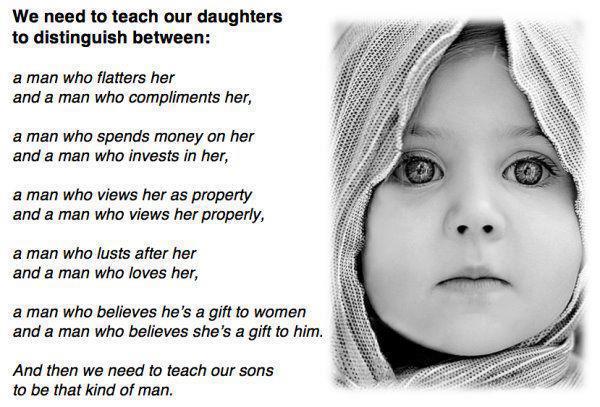I think we all have seen this image floating around on Facebook:
Men are not the problem. The system is the problem.
This is not a zero-sum game.
If a woman gains a right, it does not mean that a man is having one taken away.
Let us teach our children how to live in a respectful, just, and equal society.
I agree with this. It is excellent advice for today's world. I also think we can switch the gender nouns and pronouns on many of them and apply it to our sons. Not all, since we do not live in a world where the genders are completely equal in terms of power. I might, however, put it like this:
We need to teach our sons to distinguish between:
A woman who flatters him and a woman who compliments him,
A woman who expects him to spend money and a woman who expects him to spend time,
A woman who wishes to be property and a woman who wishes to be equal,
A woman who lusts after him and a woman who loves him,
A woman who believes she's a gift to men and a woman who believes he's a gift to her,
And to teach our daughters to be that kind of woman.
Only the second and third reflect our unequal power structures that remain in society today - commonly known as the patriarchy. And patriarchy is not the small-minded idea of a World of Evil Men; it is simply a society that values men over women, and both men and women take part in reinforcing it. (Note that patriarchy hurts men as well as women, commodifying them and confining them to narrow definitions and forcing them into 'traditionally masculine' roles instead of allowing them choices.)
Avicenna recently blogged about this next image that has been making the rounds (click to enlarge):
As you can see, it is a response to the first image that comes out of hurt and mistrust - common themes of the Men's Rights Activist (MRA) movement. They operate on the assumption that there is a war between the sexes and it is a zero-sum game, and that feminists are their enemies, not their allies.
Here is my response to this response (edited slightly from what I wrote in Avicenna's comment section):
I am really actually quite okay with all the “and a woman who…” statements except for the first one, which could be worded in a less snarky manner.
Teaching our daughters to be good communicators? Teaching them responsibility? Empathy? Loving someone for their character? I’m down for that. We should teach our sons the same things.
I have a huge problem with the first part of every single one of those statements though, because each one is a consequence of patriarchy, the same system that MRAs say does not exist outside of Women's Studies 101 classrooms.
Why do some women expect men will pay for them? Because in the past, it was their responsibility to, since women were financially dependent on men. Feminism has made it possible for women to earn their own money and go dutch on dates. Yet MRAs hate feminism.
Why do women hint, to the point of deception sometimes? Because in the past, they would be disregarded if they stated their wants, needs and opinions at best, and beaten at worst. Feminism has made it acceptable for women to have opinions without fear of retribution. Yet MRAs hate feminism.
Why do women regret sex? Because a woman who enjoys sex or a one-night stand is seen badly in the eyes of society. Why do some of them “claim date rape”? Because either 1) they were date raped, or 2) it is better in society’s eyes for them to be a victim than a slut. Feminism is WORKING on this one; we are trying to convince society that women are more valuable than their hymens. Yet MRAs hate feminism.
Why would a woman expect a man to “man up” ? Because she, too, has internalized the gender roles that show a ‘man’ to be very certain and specific things in today’s society. (I am unsure how this has to do with agreeing with her all the time, unless of course, this is an unspoken fear that women will do to men what men have done to women for centuries.) Feminism is dead set on questioning these gender roles that say men must do or be certain things to fit a standard of masculinity, and women must do or be certain things to fit a standard of femininity. Yet MRAs hate feminism.
Why would a woman love a man for what he can give her? Because she has internalized the patriarchal myth that she is nothing without a man, and that her value is based on the things he provides for her. Feminism encourages women to find worth in their own selves and provide for themselves, that they may meet men as equals and not as dispensers of financial security. Yet MRAs hate feminism.
Feminists and men's rights activists should be each other's best friends, working in solidarity for a better world where people see each other as humans, and where all people can make choices that best suit them and be free from fear and abuse. Unfortunately, the few times I have made this suggestion to MRAs, I just hear the same old talk about how feminism is the problem, and I have stopped trying.
Men are not the problem. The system is the problem.
This is not a zero-sum game.
If a woman gains a right, it does not mean that a man is having one taken away.
Let us teach our children how to live in a respectful, just, and equal society.

